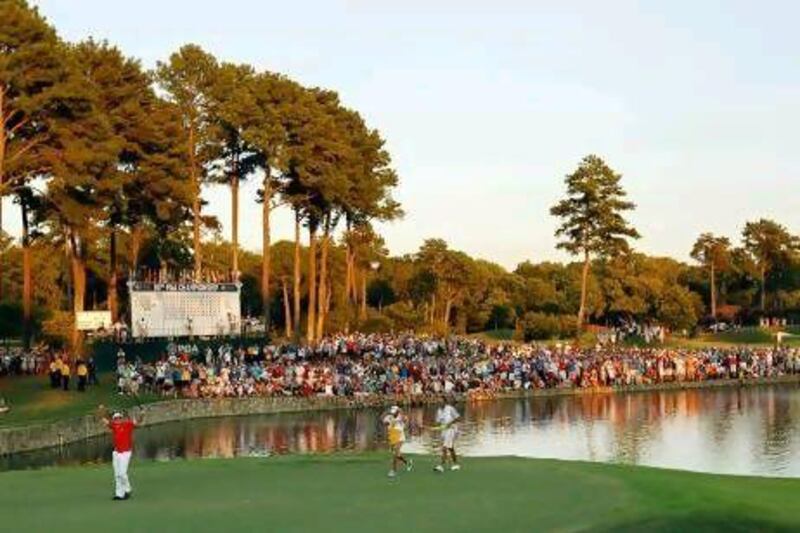Since the US PGA Championship abandoned match play in 1958 as television played a more prominent role, it has suffered something of an identity crisis among golf's four majors.
The Masters is without compare for many reasons, although it starts with being at the Augusta National every year.
The US Open is billed as the toughest test in golf, sometimes to a fault.
The British Open is the only major played on links courses.
And where does that leave the US PGA Championship?
"The fourth major," Graeme McDowell said. "It doesn't get the accolades it deserves, but there's not a guy on the range that wouldn't put it head and shoulders over any tournament in the world - apart from the other three major championships."
Ouch.
Of course, the PGA of America does not help itself by taking its premier championship to an ordinary course like Valhalla, which it owns. No other major telecast is laden with so many commercials and so little golf. And it is the only major this year where a corporate box occupies more space than grandstands along the 18th hole.
Even so, the tournament's slogan says it all - Glory's Last Shot.
It is the last chance this year to win a major. After the last putt falls on Sunday, there will not be another major for nearly eight months, when azaleas start to bloom in Augusta.
And it is worth noting the first part of what McDowell said. There is not a single player in the 156-man field - including the 20 club professionals - who would not love to hoist the heaviest trophy of the four majors. The US PGA Championship over the last decade has billed itself as the strongest field in golf, an argument it wins with evidence from the world ranking.
Barring anyone pulling out before today's opening round, it will have the top 103 players in the world. That is more than the entire field at the Masters. Going into this year, the US PGA Championship had the 10 highest-rated fields in all of golf.
But that distinction is losing some of its shine. The World Golf Championships bring at least the top 50 together three times a year, which could turn into four times a year once the HSBC Champions becomes part of the PGA Tour official schedule. The Players Championship does the same, and arguably has the strongest and deepest field in golf because it does not have 20 club professionals.
So where does that leave the US PGA Championship in the major championship rotation?
Perhaps it should be referred to as the fairest of them all.
Ask just about any player for their impressions of the US PGA Championship, whether it is held on a classic design like Southern Hills or Baltusrol, or it goes somewhere new like Kiawah Island or Whistling Straits, and the answer typically is the same.
"It's set up a little more fairly than the other ones," Steve Stricker said. "I think over the years, they've done a better job of mixing it up on a daily basis with the tees. The rough isn't over-the-top brutal. It's still hard, don't get me wrong. The tournament is always hard. It's probably not set up as hard as the other ones, but it's more fair."
"Most PGA venues I've played have been quite fair," Ernie Els said. "Some of them have been an upgrade from tour events, maybe a touch more difficult. It's the more friendly one of the four." But it is fair in other ways.
No other major rewards a player for having a good year by giving them a spot in the field. There is never anyone missing from the US PGA Championship who should be there. "Anyone can have a good year and get in the top 100, and they get in the PGA," Thomas Bjorn said. "It comes at the right time of the year for it.
"If you've played well through the season, there's your bonus. You get in a major championship. That's something they have identified, and it's a good thing. It provides every member of the major tours a chance to get into a major by playing good over a period of time.
"It's not the US Open or the [British] Open, where you play well for one day to qualify. This, you play well for a season and you get your reward."
If it is true that golf is stronger and deeper than ever - maybe that explains why the last 16 majors have 16 different winners - then it stands to reason that the US PGA Championship is one last chance for the best professionals to prove themselves at an event where score is not an issue as long as it is the lowest one.
Being the last is not all bad. Not having an obvious distinction should not matter. Geoff Ogilvy might have summed it up in a column for Golf World magazine.
"No one is walking around saying Jack Nicklaus won 13 majors and five PGAs. In the record books, a PGA victory means just as much as one at the Masters, US Open or British Open.
"That's good enough for me."
Follow us
[ @SprtNationalUAE ]





